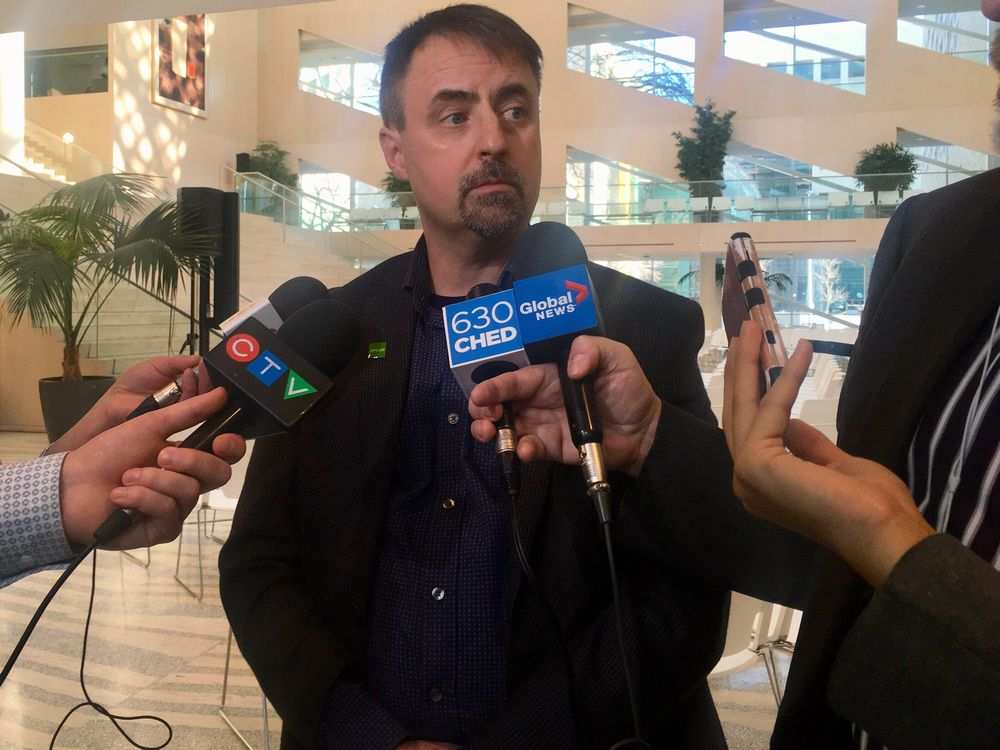Edmonton's utility company, Epcor, plans to start building a concrete wall and berms around parts of its water treatment plants at Rossdale and E.L. Smith — both in the North Saskatchewan River floodplain — to help protect the region's water supply. Construction on the flood mitigation project is slated to start next year with a budget of $65 million, with about $22 million coming from the federal and provincial governments.
Edmonton removed two water fountains because of complaints by police and library staff
City officials ordered two Downtown public water fountains be disconnected ahead of a heat wave last weekend because of complaints from the police and library staff, shedding light on how Edmonton navigates conflicts around impoverished people’s basic needs and demands by others to tackle social disorder and safety concerns. Epcor cut off the water supply from the fire hydrants at the city’s request last Thursday. The weekend after the bottle filling stations at 96 Street near Bissell Centre West and 100 Street outside Stanley A. Milner Library were removed, temperatures were so hot Environment Canada warned the public to take precautions because of the heat.
Canmore water ban lifted, Epcor fixing leaks
The ban on non-essential water use in Canmore and the surrounding area has been lifted, allowing residents to resume normal water use. On Wednesday afternoon, the Town of Canmore and Epcor thanked residents for complying with the ban that had been in place since Friday. Residents and businesses in Canmore, Harvie Heights and Deadman’s Flats were asked to refrain from using water for things like laundry, watering lawns, washing cars, washing driveways or sidewalks, or from filling hot tubs or pools. That reduced usage helped restore water levels in the Grassi Reservoir, which is now up to “appropriate” water levels.
Canmore, Alta., under non-essential water ban as hot temperatures cause low reservoir
Lead-reducing chemicals now flowing in Edmonton’s water: Epcor
Epcor began adding orthophosphate at its two local water treatment plants last week, two years later than initially planned, the utility confirmed with Postmedia. This treatment will create protective coatings inside pipes to prevent lead from leaching into drinking water, both for Epcor’s pipes and those of private property owners, in hopes of making sure lead concentration in water citywide meets Health Canada’s standards. It’s expected to take up to six months to take full effect.
Epcor to add lead-reducing chemical to Edmonton's water in 2023, two years behind schedule
Levels of lead in drinking water city-wide should begin dropping in early 2023 when orthophosphate is added at Edmonton’s water treatment plant, two years later than initially promised. Epcor announced Thursday the odourless, colourless chemical will be added to city water by early 2023. Orthophosphate creates a protective barrier inside a pipe to prevent lead from leaching into the water. Around 4,200 Edmonton homes are currently serviced by lead pipes owned by Epcor, the utility said. Adding this treatment by the end of 2020 was promised as part of broader lead-reducing plans approved by city council in March 2019 around the time Health Canada reduced the concentration of lead in water allowed to five micrograms per litre from 10 micrograms per litre.
Water restrictions in effect for Edmonton-area communities, southeast Edmonton
Get the lead out: City homes will be affected by new Health Canada regulations on lead in water
Looming changes to Health Canada’s acceptable concentration levels of lead in drinking water could see a wash of city homes creep above the recommended level, Epcor warned city council’s utility committee Thursday. Presently, it’s considered safe to have up to 10 micrograms per litre in drinking water. But Epcor officials said Thursday that the federal health agency is signalling it will lower that level to five micrograms per litre, a change that will affect more than 30,000 Edmonton homes.









